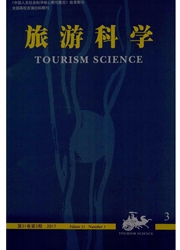

 中文摘要:
中文摘要:
生态文明是人类文明发展的高端形态。生态文明导向的旅游发展方式转型,实质是旅游科学发展方式的实践建构和理论探索。传统旅游发展方式注重景观资源、资本要素的投入,忽视人本关怀。旅游业作为"国民经济战略性支柱产业与人民更加满意的服务业"的"国计民生"高端定位,为旅游发展方式转型提出了明确的方向。新旅游发展方式,是一种呵护自然生态、彰显人本关怀、坚守公平正义、凸显科学与伦理的文明发展方式。为此,本文基于长江口的崇明岛案例,探讨了旅游发展方式转型的低碳化模式,提出了生态旅游质量提升的一般理论模式。
 英文摘要:
英文摘要:
Ecological civilization is the top end of human civilization. The tourism transition oriented by ecological civilization is in fact both the practical construction and theoretical exploration of the development pattern for tourism science. Traditional tourism development focuses on landscape resources and capital inputs but ignores humanistic concerns. Tourism, the higher status of national welfare and citizens' livelihood and positioned as the strategic pillar service industry with which citizens are most contented, specifies the direction of tourism development pattern transition. The authors believe that the new pattern is a civil development pattern which cares natural ecology, manifests humanistic concern, upholds fairness and justice, and highlights science and ethics. This paper mainly discusses low-carbon pattern of tourism development, proposes a general theoretical model for enhancing the quality of eeo-tourism based on the case study of Chongming Island at Yangtze River Estuary.
 同期刊论文项目
同期刊论文项目
 同项目期刊论文
同项目期刊论文
 期刊信息
期刊信息
